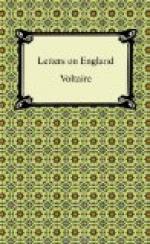William Penn inherited very large possessions, part of which consisted in Crown debts due to the Vice-Admiral for sums he had advanced for the sea service. No moneys were at that time more insecure than those owing from the king. Penn was obliged to go more than once, and “thee” and “thou” King Charles and his Ministers, in order to recover the debt; and at last, instead of specie, the Government invested him with the right and sovereignty of a province of America, to the south of Maryland. Thus was a Quaker raised to sovereign power. Penn set sail for his new dominions with two ships freighted with Quakers, who followed his fortune. The country was then called Pennsylvania from William Penn, who there founded Philadelphia, now the most flourishing city in that country. The first step he took was to enter into an alliance with his American neighbours, and this is the only treaty between those people and the Christians that was not ratified by an oath, and was never infringed. The new sovereign was at the same time the legislator of Pennsylvania, and enacted very wise and prudent laws, none of which have ever been changed since his time. The first is, to injure no person upon a religious account, and to consider as brethren all those who believe in one God.
He had no sooner settled his government, but several American merchants came and peopled this colony. The natives of the country, instead of flying into the woods, cultivated by insensible degrees a friendship with the peaceable Quakers. They loved these foreigners as much as they detested the other Christians who had conquered and laid waste America. In a little time a great number of these savages (falsely so called), charmed with the mild and gentle disposition of their neighbours, came in crowds to William Penn, and besought him to admit them into the number of his vassals. It was very rare and uncommon for a sovereign to be “thee’d” and “thou’d” by the meanest of his subjects, who never took their hats off when they came into his presence; and as singular for a Government to be without one priest in it, and for a people to be without arms, either offensive or defensive; for a body of citizens to be absolutely undistinguished but by the public employments, and for neighbours not to entertain the least jealousy one against the other.




